 Petzlover
PetzloverMiniature Schnauzer is originated from Germany but Schnauzerdor is originated from United States. Miniature Schnauzer may grow 26 cm / 10 inches shorter than Schnauzerdor. Miniature Schnauzer may weigh 25 kg / 55 pounds lesser than Schnauzerdor. Both Miniature Schnauzer and Schnauzerdor has same life span. Both Miniature Schnauzer and Schnauzerdor has almost same litter size. Miniature Schnauzer requires Moderate Maintenance. But Schnauzerdor requires Low Maintenance
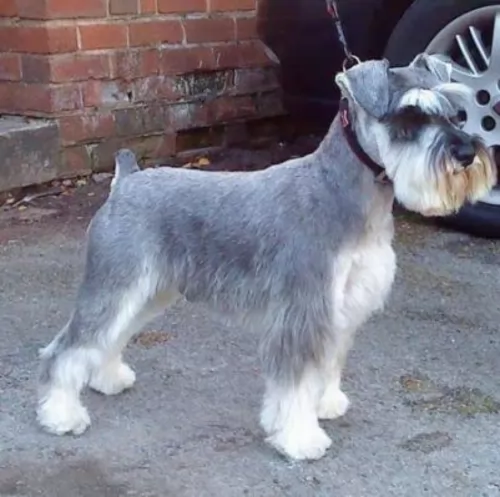 Miniature Schnauzers were first bred in Germany in the 19th century being bred from Affenpinschers and Standard Schnauzers.
Miniature Schnauzers were first bred in Germany in the 19th century being bred from Affenpinschers and Standard Schnauzers.
This dog was always used to control rats on farms, but these days he is more a companion. It is believed that the start of the modern Miniature Schnauzer in the United States was around 1924 when dogs were imported from Germany.
It was in 1933 that the Miniature Schnauzer was recognized by the AKC as a separate breed from the Standard Schnauzer.
With these modern day mixed-breeds, there is no history or records of when they came into being so we assume the USA. And so it it with the Schnauzer Lab mix breed. Each of the parent dogs – the Schnauzer and the Labrador, have their own histories.
It is uncertain how the Schnauzerdor came into being. Not so long ago, puppies born from different parents were simply labeled mongrels, but today they have been specifically bred. With these dogs you are never really sure how the puppies will turn out, and even within one litter, the puppies can be different looking.
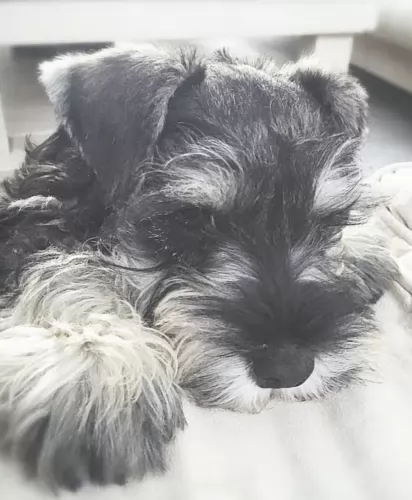 The Miniature Schnauzer is a small dog breed that stands between 30 to 36cm in height and weighs between 5 and 10kg.
The Miniature Schnauzer is a small dog breed that stands between 30 to 36cm in height and weighs between 5 and 10kg.
He has a sturdy body with a dense, wiry coat which most people prefer to have stripped. Because stripping is quite tedious, many of these dog owners prefer to have the coat clipped which actually gives the coat a greyish look to it.
The coat is usually a mix of black and silver. Some people refer to the Miniature Schnauzer as having a salt-and-pepper coat – hairs that are a mix of black and white. The dog has a double coat with the outer coat being wiry and the undercoat being a lot softer.
This is a dog that will need to be groomed frequently to prevent matting. A noticeable feature with these dogs is the rectangular shaped head with alert slanted eyes and bushy eyebrows, mustache and beard. In fact the word ‘Schnauzer’ means beard or muzzle.
The ears have been traditionally cropped but these days they are left and then they tend to be half-erect, half-floppy.
This is a tough little dog, fearless, cheeky, arrogant, alert and also friendly. A draw-card with him is that he is considered as a low-shedder and being hypoallergenic.
They’re very intelligent dogs too and will learn quickly when you give him training and socialization. This is important for a dog like this as he can quickly show you that he is strong willed and independent. Training and socialization makes him much nicer as he becomes more balanced and obedient.
He is full of life and extroverted and you can count on him to join you wherever you are and whatever you’re doing. Whether watching TV, swimming or hiking, he’ll be there and turn every occasion into a festive event. He is a loving, loyal dog, making a splendid pet.
He's protective of his human family and tends to be suspicious of strangers, and this is what makes him such a great watchdog.
A Schnauzer Labrador or Schnauzerdor is much the same size of the Labrador if the parents were a Labrador and a standard Schnauzer.
You can expect the height to be roughly between 50 to 62cm and weight could be anything from 20 to 35kg. Everything will depend on the size of the Schnauzer really as there are 3 kinds – miniature, standard and giant.
There’ is no way of knowing what physical characteristics the Schnauzerdor will get from each parent. The coat of these dogs can be anything from smooth to wiry and they can also be in a number of different colors, from yellow to cream, grey, black, brown.
Schnauzers and Labradors are intelligent dogs so the Schnauzerdor is guaranteed to turn out smart. Make sure that your Schnauzerdor receives training and socialization. Clever dogs like this won’t battle with training and it can ensure your pet is obedient and balanced, knowing how to behave around different people and in different situations.
Schnauzers are considered non-shedding and hypoallergenic, so it could be that your Schnauzerdor ends up with a low shedding coat.
Your dog is likely to be social, playful, energetic and a good watchdog. They are loving and loyal to their human family members.
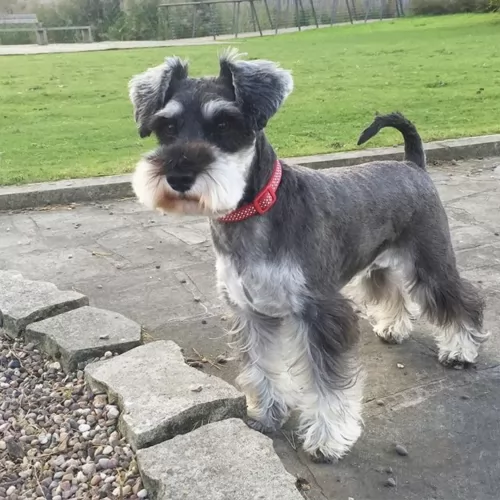 Miniature Schnauzers are such adaptable little dogs, quite happy to make a home with you in the city or in the countryside.
Miniature Schnauzers are such adaptable little dogs, quite happy to make a home with you in the city or in the countryside.
They’re sociable dogs, so just being with his human family wherever they are will suit him well. If he lives in the city however, he will need to have a walk everyday or taken to the park for a run.
He is also a dog that scarcely sheds, so he suits people battling with allergies. With an average life expectancy of 12 to 14 years, if you nurture your Mini Schnauzer and give him the best food and exercise there is, as well as loving him, you’re going to have a loyal and devoted pet.
The Schnauzer Lab is a crossbreed so this essentially means that your dog can have behavioral traits from either of the parents.
They're social, friendly, loving dogs that can also make good watchdogs. The Schnauzerdor gets on well with children and can get on with other dogs too. With training and socialization he becomes much more amicable and obedient, making a super family companion.
You can be sure that he is going to make your family a great playmate, friend and pet.
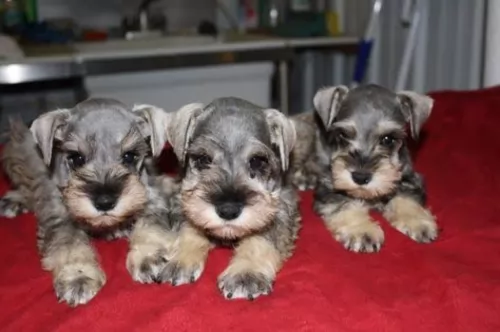 Your Miniature Schnauzer is pretty healthy and he isn’t likely to cost you much in terms of vet fees. There are however some common dog problems that you want to be aware of such as cataracts of the eye and hypothyroidism.
Your Miniature Schnauzer is pretty healthy and he isn’t likely to cost you much in terms of vet fees. There are however some common dog problems that you want to be aware of such as cataracts of the eye and hypothyroidism.
This a a problem in the lens of the eye. The lens should be clear, and when a dog has a cataract, it obscures the vision. The size of the cataract can lead to blindness.
Diabetes in a dog can bring on cataracts as can genetics or damage to the eye from exposure to ultraviolet light. Fortunately, dogs with cataracts can still see. Dogs with old cataracts can have surgery to remove them.
When a dog owner suspects a cataract in their pet’s eye it is best to treat it immediately with anti-inflammatory dog cataract eye drops. Cataracts never go away however without surgery.
The thyroid gland in the neck produces a hormone called thyroxine. It controls metabolism, but with hypothyroidism, enough of the hormone isn’t made. Its a common disease which affects all dog breeds.
Signs of hypothyroidism include hair loss, weight gain, intolerance to cold and a troublesome skin. To have the disease diagnosed, the vet will do a series of blood tests.
Your Schnauzerdog can live to be between 10 and 14 years of age if looked after well. There are some dog illnesses that many dogs succumb to, regardless of breed or age -
Hip dysplasia is when the hip joints don’t develop properly. You notice your dog is reluctant to play and even battles to get up again after lying down. Hip dysplasia can lead to painful arthritis and you will need to get him to the vet for pain relief and a treatment plan.
This dog loves his food, and because you love him so much, it will be tempting to pop treats into his mouth all the time. It is so easy to overfeed these dogs and obesity is a big problem and can contribute to joint problems with a dog as well as strain on the heart and other organs.
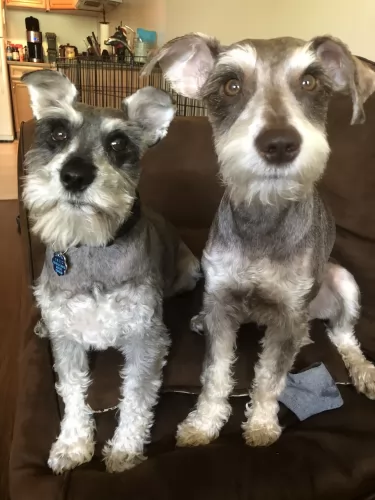 Let’s look at several ways you need to care for your Miniature Schnauzer -
Let’s look at several ways you need to care for your Miniature Schnauzer -
Make sure you have his puppy injections on time. This means knowing which veterinarian you’ll use. Later on if you don’t want to go in for breeding, you will need to have your pet spayed or neutered.
Make sure you have a nice warm, dry spot for your dog to sleep. It can be a cardboard box, or you can buy a dog basket or sleeping platform. Make sure your pet loves it and knows he can retreat to it anytime he wants.
If he goes outside for a few hours, make sure that he has a place to lie in the shade and away from the elements.
Good food promotes good health and longevity. You can feed your pet one of the top quality commercially manufactured foods and give your pet some variety by adding in some boiled chicken, vegetables and brown rice. Some raw meat occasionally can also be excellent for your pet.
Check your Schnauzerdor’s ears and eyes for infection. Look inside his mouth and check for bad teeth. When you brush him twice a week, check him over for new lumps.Trim his claws.
Your Schnauzerdor is an active dog and he will require vigorous exercise every day. A daily walk won't be enough for this dog. He will want runs in the park off his leash as well as rope- and ball games.
Give your Schnauzerdor the best chance to enjoy good health by providing him with good food.
There are some good commercially manufactured dog foods out there and they can be a good, convenient choice, especially if you choose the high quality ones known for their wholesome, natural ingredients.
Give him some home-made food too which can be added into the dry kibble twice a week. Boil brown rice and chicken in a pot and add in sweet potatoes, carrots and spinach. Chop all this up and as a treat, add some of this into the dry kibble.
Your dog’s wagging tail will be all the thanks you need. Try to also include some raw meat occasionally. Never leave your pet without a constant source of fresh, cool water.